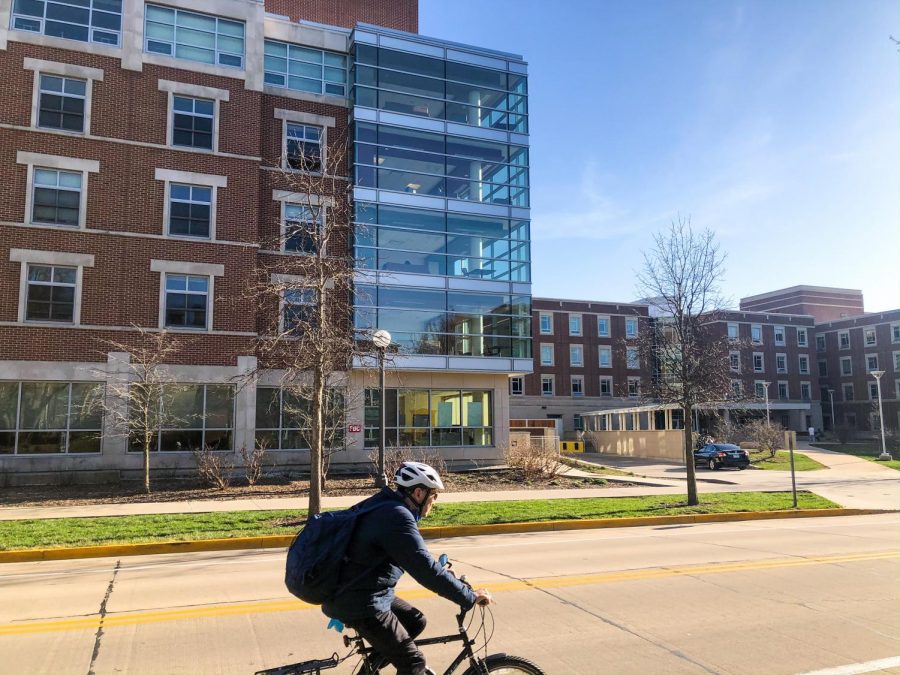Students, resident advisers navigate community
Cameron Krasucki The Daily Illini
A biker rides by Nugent Hall on Gregory Drive on Monday afternoon. Students and resident advisers have had to adapt to dorm life during an academic year like no other due to COVID-19.
Apr 1, 2021
Living in University Housing during this school year has been unique in comparison to years past because of the COVID-19 pandemic and the precautionary measures taken to ensure student and staff safety. With these changes, the relationship and sense of community between residents and their resident advisers and directors has shifted.
“COVID-19 came at the most pivotal moment in (students’) personal, educational and pre-professional development,” Chelsea Hamilton, University Housing spokesperson said. “It was important to University Housing to continue offering some sort of the on-campus residential experience.”
Housing has offered virtual events and social programs and small, outdoor gatherings.
“The resilience of University Housing residents during COVID-19 illustrates the power of Illinois and importance of a supportive peer network,” Trish Anton, director of Residential Life for University Housing said. “Residents and student staff have helped one another transition to the new normal, find campus resources, foster support circles and create productive daily routines.”
A greater sense of community has become prevalent in many University Housing dorms. In the fall, University Housing hosted a pulse check survey that 23% of residents participated in. Data at that time found that 65% of residents “strongly agreed” and 29% “agreed” that their RA maintains a clean, safe and welcoming environment.
“What this data shows is that the relationships between RAs/MAs and hall residents and the overall sense of community in the residence halls is strong and spirited,” Hamilton said. “As we share with incoming residents, in order to get the most out of your on-campus experience, you sometimes have to seek it out. This advice has never been truer than now.”
Nathan Sprovieri, Townsend Hall RA, said students are craving more social interactions and a sense of belonging than in years past. This has, in turn, created a greater sense of community among residents.
“I’m a lot closer with my residents this year because of what we are all going through this year,” Sprovieri said. “I think that just because everyone is craving social interaction, when you say ‘hi’ to someone in the hall, it turns into a spinoff conversation.”
While a greater sense of community and closer relationships have been achieved in some communities, it has still proven to be a challenge for some students and RAs to connect, due to the virtual nature of many hall events and meetings.
Sophia Jandry, freshman in LAS, has noticed mixed relationships between residents and their RAs. This can be caused by a variety of factors, from a lack of communication to a lack of interest in remote or virtual hall events.
“It definitely depends on the level of respect people have for their RAs and vice versa,” Jandry said. “It’s so important to respond cooperatively when your RA tries to get to know you, and will help in the long run for leniency or if you ever need a favor.”
A prevalent issue during the pandemic has been a feeling of isolation and the toll it takes on mental health. While there are resources available, it has been more difficult for some to connect to the services University Housing offers.
“For many, I think the pandemic heightened a lot of emotions and made it much harder to feel grounded while undergoing a ton of change all at once,” Jandry said. “I saw firsthand the toll that it took on my mental health and those around me.”
As the school year enters its final quarter, RAs encourage residents to reach out and take advantage of the resources available. Even though the nature of relationships has changed due to the pandemic, Sprovieri said RAs and RDs are still community leaders who want to help students and see them succeed.
“I would definitely encourage students to utilize their resident advisors to the best of their ability,” Sprovieri said. “I think sometimes RAs and students forget what the relationship is supposed to be. So if there are students that aren’t getting the resources, connections or have campus-related uncertainties, I would encourage residents to reach out.”






